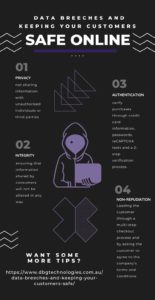
eCommerce business owners are all too aware of these issues and are increasing their security measures[i].
eCommerce security focuses on maintaining safe and secure electronic transactions for the buying and selling of goods and services over the web. Several protocols are put in place to ensure the safety and protection of those involved in the online transaction.
Consumers need to know that they can trust your brand before they can shop with you. Having robust eCommerce security practices in place is crucial to building trust with your customers.[ii]
There are the four pillars of security that every eCommerce brand must follow;
Privacy – not sharing information with unauthorised individuals or third parties.
Integrity – ensuring that information shared by consumers will not be altered in any way
Authentication – verify purchases through credit card information, passwords, reCAPTCHA tests and a 2-step verification process.
Non-Repudiation – Leading the customer through a multi-step checkout process and by asking the customer to agree to the company’s terms and conditions. [iii]
Teaching your customers to spot a phishing attempt:
- Mismatched URLs: The URL in the email or message doesn’t match the anchor text, or the URL contains out-of-place words, letters, or numbers.
- Poor spelling and grammar: The email or message that you receive contains obvious spelling and grammatical errors that would be unbefitting of a large company to send out.
- You didn’t initiate the correspondence: If you receive an “urgent message”, “final warning”, or “lucky winner” message, ask yourself if you’re even expecting any such messages before handing over any information.
- The offer/threat is too good/bad to be true: If the message is offering a large sum of money or a lofty prize, or worse yet, a hefty fine or legal action, take a step back and ensure the message is legitimate.
Scams
Scams have been around a long time and criminals are becoming more and more sophisticated. Our scam awareness tips will help you stay one step ahead of scams.
A scam is when someone contacts you by phone, email or online with the intention of stealing your information or money. These scams often use company names or logos to look like they come from a business or organisation you know, which can make it difficult for you to know what’s real and what’s fake.
Here are some tips to share with your customers on staying safe from digital fraud:
- Be cautious when contacted by people you don’t know
Never provide personal or banking details to someone through an unsolicited call or message. Always call the organisation or company back on an official number and start the conversation there. - Never provide remote access (where someone else can control your computer) to your phone, computer or bank account
- Regularly check your bank account transactions and report anything suspicious as soon as you can
- Set your social media profiles to private and be mindful of what you share
- Use complicated passwords including mixed capitals, numbers and symbols combinations [iiii]
[i] https://www.bigcommerce.com.au/articles/ecommerce/ecommerce-website-security/
[ii] https://www.coredna.com/blogs/ecommerce-website-security
[iii] https://www.coredna.com/blogs/ecommerce-website-security
[iii] https://www.nab.com.au/about-us/security/online-safety-tips
